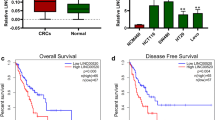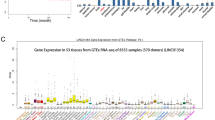Abstract
Background
Colorectal cancer (CRC) is one of the most prevalent cancers and a common cause of cancer-related death. Long noncoding RNAs have been reported to play an essential role in the development of CRC.
Aims
This study aimed to investigate the possible function of LINC00460 in CRC.
Methods
Initially, microarray-based gene expression profiling of CRC was employed to identify differentially expressed genes. Next, the expression of LINC00460 was examined and the cell line presenting with the highest LINC00460 expression was selected for subsequent experimentation. Then, the interaction among LINC00460, ERG, and WWC2 was identified. The effect of LINC00460 on proliferation, migration, invasion, and epithelial–mesenchymal transition (EMT)-related factors as well as tumorigenicity of transfected cells was examined with gain- and loss-of-function experiments.
Results
LINC00460 was robustly induced while WWC2 was poorly expressed in CRC. In addition, LINC00460 could down-regulate WWC2 through interaction with ERG, which led to promoted invasion, migration, and EMT of CRC cells in addition to tumor growth in vivo. Besides, down-regulation of LINC00460 exerted inhibitory effect on these biological activities.
Conclusion
Taken together, the key findings of the current study provided evidence suggesting that silencing of LINC00460 could potentially suppress EMT of CRC cells by increasing WWC2 via ERG, and highlighting that knockdown of LINC00460 could serve as a therapeutic target for CRC treatment.






Similar content being viewed by others
References
Liang WC, Fu WM, Wong CW, et al. The lncRNA H19 promotes epithelial to mesenchymal transition by functioning as miRNA sponges in colorectal cancer. Oncotarget. 2015;6:22513–22525.
Ghoncheh M, Mohammadian M, Mohammadian-Hafshejani A, Salehiniya H. The incidence and mortality of colorectal cancer and its relationship with the human development index in Asia. Ann Glob Health. 2016;82:726–737.
Johnson CM, Wei C, Ensor JE, et al. Meta-analyses of colorectal cancer risk factors. Cancer Causes Control. 2013;24:1207–1222.
Liu T, Zhang J, Chai Z, Wang G, Cui N, Zhou B. Ginkgo biloba extract EGb 761-induced upregulation of LincRNA-p21 inhibits colorectal cancer metastasis by associating with EZH2. Oncotarget. 2017;8:91614–91627.
Ngune I, Jiwa M, McManus A, Parsons R, Hodder R. A trial of a self-assessment tool of problems following treatment of colorectal cancer: a prospective study in Australia primary care. Eur J Cancer Care (Engl). 2016;25:69–78.
Yang W, Ning N, Jin X. The lncRNA H19 promotes cell proliferation by competitively binding to miR-200a and derepressing beta-catenin expression in colorectal cancer. Biomed Res Int. 2017;2017:2767484.
Worku T, Bhattarai D, Ayers D, et al. Long non-coding RNAs: the new horizon of gene regulation in ovarian cancer. Cell Physiol Biochem. 2017;44:948–966.
Li K, Sun D, Gou Q, et al. Long non-coding RNA linc00460 promotes epithelial-mesenchymal transition and cell migration in lung cancer cells. Cancer Lett. 2018;420:80–90.
Liang Y, Wu Y, Chen X, et al. A novel long noncoding RNA linc00460 up-regulated by CBP/P300 promotes carcinogenesis in esophageal squamous cell carcinoma. Biosci Rep. 2017;37:BSR20171019.
Wang X, Mo FM, Bo H, et al. Upregulated expression of long non-coding RNA, LINC00460, suppresses proliferation of colorectal cancer. J Cancer. 2018;9:2834–2843.
Strzepek A, Kaczmarczyk K, Bialas M, et al. ERG positive prostatic cancer may show a more angiogenetic phenotype. Pathol Res Pract. 2014;210:897–900.
Park K, Tomlins SA, Mudaliar KM, et al. Antibody-based detection of ERG rearrangement-positive prostate cancer. Neoplasia. 2010;12:590–598.
Wennmann DO, Schmitz J, Wehr MC, et al. Evolutionary and molecular facts link the WWC protein family to Hippo signaling. Mol Biol Evol. 2014;31:1710–1723.
Zhang Y, Yan S, Chen J, et al. WWC2 is an independent prognostic factor and prevents invasion via Hippo signalling in hepatocellular carcinoma. J Cell Mol Med. 2017;21:3718–3729.
Gautier L, Cope L, Bolstad BM, Irizarry RA. Affy–analysis of Affymetrix GeneChip data at the probe level. Bioinformatics. 2004;20:307–315.
Smyth GK. Linear models and empirical bayes methods for assessing differential expression in microarray experiments. Stat Appl Genet Mol Biol.. 2004;3, Article ID 3.
Kuwata T. Pathological evaluation and grading for neoadjuvant therapy. Gan To Kagaku Ryoho. 2012;39:1307–1311.
Cheng Y, Huang J, Zhu Z, Xu H. Rationality of N3 classification and its sub-classification in TNM classification system for advanced gastric cancer. Zhonghua Wei Chang Wai Ke Za Zhi. 2016;19:749–755.
Livak KJ, Schmittgen TD. Analysis of relative gene expression data using real-time quantitative PCR and the 2(-Delta Delta C(T)) method. Methods. 2001;25:402–408.
Li P, Xing W, Xu J, et al. microRNA-301b-3p downregulation underlies a novel inhibitory role of long non-coding RNA MBNL1-AS1 in non-small cell lung cancer. Stem Cell Res Ther. 2019;10:144.
Yang H, Shang D, Xu Y, et al. The LncRNA connectivity map: using LncRNA signatures to connect small molecules, LncRNAs, and diseases. Sci Rep. 2017;7:6655.
Zhu L, Chu H, Gu D, et al. A functional polymorphism in miRNA-196a2 is associated with colorectal cancer risk in a Chinese population. DNA Cell Biol. 2012;31:350–354.
Wang J, Lei ZJ, Guo Y, et al. miRNA-regulated delivery of lincRNA-p21 suppresses beta-catenin signaling and tumorigenicity of colorectal cancer stem cells. Oncotarget. 2015;6:37852–37870.
Lian Y, Yan C, Xu H, et al. A novel lncRNA, LINC00460, affects cell proliferation and apoptosis by regulating KLF2 and CUL4A expression in colorectal cancer. Mol Ther Nucleic Acids. 2018;12:684–697.
Angrand PO, Vennin C, Le Bourhis X, Adriaenssens E. The role of long non-coding RNAs in genome formatting and expression. Front Genet. 2015;6:165.
Jiang H, Li T, Qu Y, et al. Long non-coding RNA SNHG15 interacts with and stabilizes transcription factor slug and promotes colon cancer progression. Cancer Lett. 2018;425:78–87.
Kong YG, Cui M, Chen SM, Xu Y, Xu Y, Tao ZZ. LncRNA-LINC00460 facilitates nasopharyngeal carcinoma tumorigenesis through sponging miR-149-5p to up-regulate IL6. Gene. 2018;639:77–84.
Korpal M, Lee ES, Hu G, Kang Y. The miR-200 family inhibits epithelial-mesenchymal transition and cancer cell migration by direct targeting of E-cadherin transcriptional repressors ZEB1 and ZEB2. J Biol Chem. 2008;283:14910–14914.
Araki K, Shimura T, Suzuki H, et al. E/N-cadherin switch mediates cancer progression via TGF-beta-induced epithelial-to-mesenchymal transition in extrahepatic cholangiocarcinoma. Br J Cancer. 2011;105:1885–1893.
Wang M, Ren D, Guo W, et al. N-cadherin promotes epithelial-mesenchymal transition and cancer stem cell-like traits via ErbB signaling in prostate cancer cells. Int J Oncol. 2016;48:595–606.
Du C, Zhang C, Hassan S, Biswas MH, Balaji KC. Protein kinase D1 suppresses epithelial-to-mesenchymal transition through phosphorylation of snail. Cancer Res. 2010;70:7810–7819.
Xia W, Ma X, Li X, et al. miR-153 inhibits epithelial-to-mesenchymal transition in hepatocellular carcinoma by targeting Snail. Oncol Rep. 2015;34:655–662.
Ye LY, Chen W, Bai XL, et al. Hypoxia-induced epithelial-to-mesenchymal transition in hepatocellular carcinoma induces an immunosuppressive tumor microenvironment to promote metastasis. Cancer Res. 2016;76:818–830.
Jiang Y, Xu W, Lu J, He F, Yang X. Invasiveness of hepatocellular carcinoma cell lines: contribution of hepatocyte growth factor, c-met, and transcription factor Ets-1. Biochem Biophys Res Commun. 2001;286:1123–1130.
Acknowledgments
We acknowledge and appreciate our colleagues for their valuable efforts and comments on this paper.
Author information
Authors and Affiliations
Contributions
Jing Yang designed the study. Chaoqun Ma and Hong Gu collated the data, designed and developed the database, carried out data analyses, and produced the initial draft of the manuscript. Bao Yuan contributed to drafting the manuscript. All authors have read and approved the final submitted manuscript.
Corresponding author
Ethics declarations
Conflict of interests
They authors declare that they have no conflict of interests.
Ethics statement
The current study was approved by the Ethics Committee of Affiliated Hospital of Nanjing University of Chinese Medicine. Signed informed consents were obtained from all participants. Nude mice were enrolled for in vivo studies and were cared for according to the Guide for the Care and Use of Laboratory Animals published by the National Institutes of Health. All efforts were made to minimize the suffering of the included animals.
Additional information
Publisher's Note
Springer Nature remains neutral with regard to jurisdictional claims in published maps and institutional affiliations.
Electronic supplementary material
Below is the link to the electronic supplementary material.
Supplementary Fig. 1
LINC00460 over-expression promotes proliferation, migration, invasion, and EMT of LoVo cells. A, expression patterns of LINC00460 in LoVo cells treated with over-expressed or silenced LINC00460 detected by RT-qPCR. B, the proliferation of LoVo cells treated with over-expressed or silenced LINC00460 detected by EdU assay. C, the migration of LoVo cells treated with over-expressed or silenced LINC00460 detected by Transwell assay. D, the invasion of LoVo cells treated with over-expressed or silenced LINC00460 detected by Transwell assay. In panel A–D, * p < 0.05 vs. the blank group or the GapmeR-NC group. E, Western blot analysis of E-cadherin, N-cadherin, Snail, and TWSIT1 protein patterns in LoVo cells treated with over-expressed or silenced LINC00460. The above data were all measurement data and expressed as mean ± standard error. Data among multiple groups were compared by one-way ANOVA. The experiment was repeated three times independently. (EPS 6341 kb)
Rights and permissions
About this article
Cite this article
Yuan, B., Yang, J., Gu, H. et al. Down-Regulation of LINC00460 Represses Metastasis of Colorectal Cancer via WWC2. Dig Dis Sci 65, 442–456 (2020). https://doi.org/10.1007/s10620-019-05801-5
Received:
Accepted:
Published:
Issue Date:
DOI: https://doi.org/10.1007/s10620-019-05801-5




